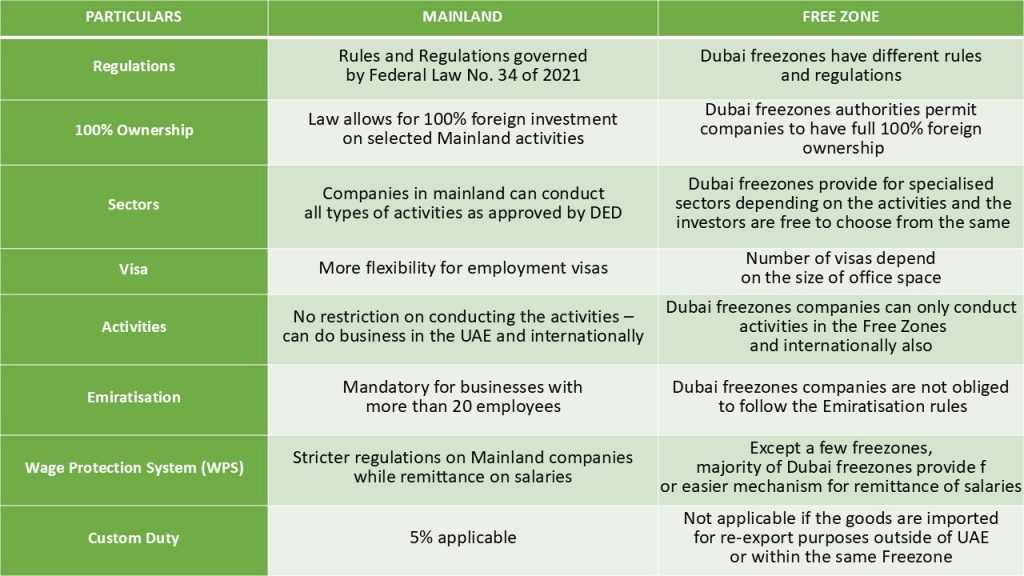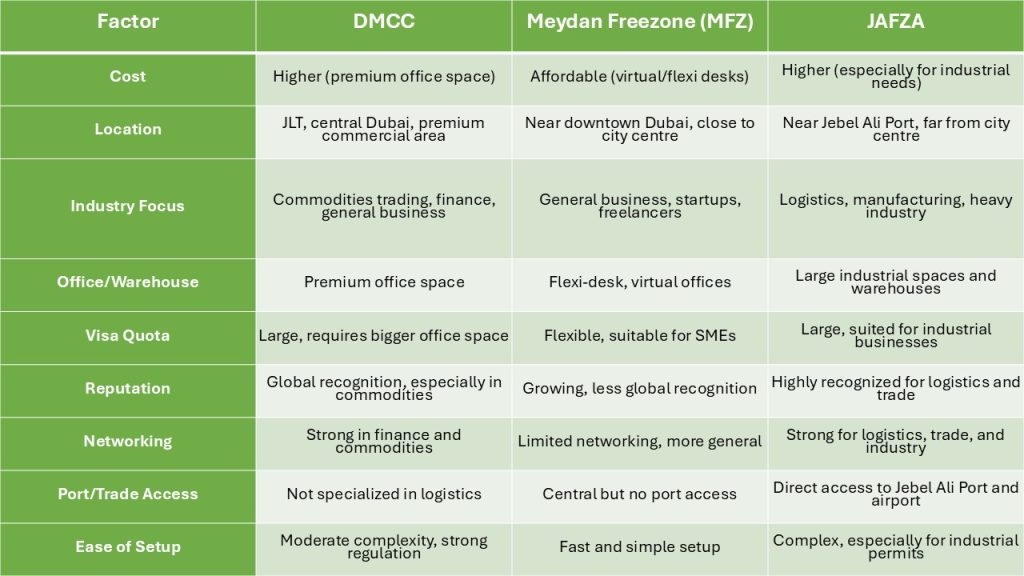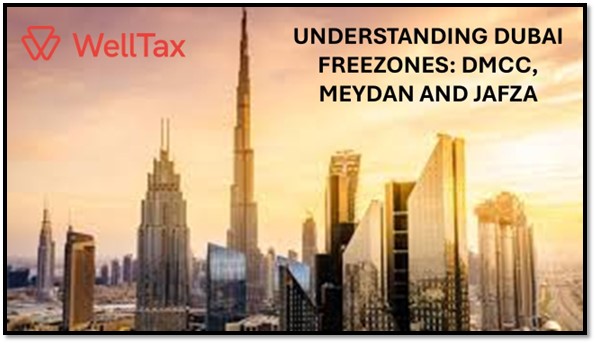Overview of Dubai Freezones – Why Choosing it over Dubai Mainland?
Dubai is home to several freezones, which are special areas where businesses can operate with fewer restrictions compared to Dubai Mainland.
These freezones in Dubai offer many benefits, making them attractive for entrepreneurs. Here below is a table serving as a summary, explaining the differences between Freezone and Dubai Mainland:

Importance of Choosing the Right Dubai Freezones
Selecting the right Dubai freezones is crucial for your business’s success. The right choice can lead to:
- Cost savings: Different freezones have varying fees and costs.
- Access to specific markets: Some Dubai freezones cater to certain industries better than others.
- Support services: The level of support and resources available can differ significantly (incubators, partners, incentives).
Key Differences Between DMCC, Meydan, and JAFZA
Dubai freezones have their unique features:
- DMCC: A Dubai freezone known for commodities and trade, it offers a wide range of business activities.
- Meydan: A Dubai freezone that focuses on innovation and growth, making it ideal for tech and creative industries.
- JAFZA: Dubai freezone considered as a major hub for global trade, especially in logistics and manufacturing.
Understanding these differences can help you make an informed decision about where to set up your business.
In this article, we will compare 3 Dubai freezones, analyzing the cost of setup and maintenance, location and accessibility, industry focus, and the availability of office and warehouse space. Additionally, we will examine visa quotas, reputation, networking opportunities, access to ports, and the regulatory framework to provide insights for businesses seeking the best freezone option.
- Cost of Setup and Maintenance in each Dubai freezones
- DMCC: Generally, DMCC is known for higher setup and renewal costs, particularly for companies requiring office space in Jumeirah Lakes Towers (JLT), a premium location. While offering high-quality infrastructure, the costs are suited for businesses that value the added prestige and services.
- Meydan Free Zone: MFZ is one of the most affordable options. It offers competitive setup fees, license renewals, and flexible office space options (like virtual offices and flexi-desks), making it a great choice for startups, freelancers, and SMEs on a tight budget.
- JAFZA: The cost of setup in JAFZA can be higher, especially for businesses that require large warehouses or industrial spaces. Since it’s located near Jebel Ali Port, it offers infrastructure tailored for large-scale logistics, manufacturing, and trading businesses, which comes with higher operational costs.
- Location and Accessibility
- DMCC: Located in JLT, DMCC offers a central, high-end commercial location with easy access to Dubai’s key business districts. It’s close to the city’s financial hubs, providing easy access to clients and networking opportunities.
- Meydan Free Zone: MFZ is located in Meydan, near Dubai Downtown, making it a strategic location for companies that want proximity to the city’s heart while still enjoying lower costs. It’s ideal for businesses looking for a balance between cost and accessibility.
- JAFZA: Situated near Jebel Ali Port and Al Maktoum International Airport, JAFZA is ideal for logistics, shipping, and industrial businesses that need quick access to Dubai’s main ports and trade routes. However, it’s further from the city centre, which might be inconvenient for service-oriented businesses needing regular interaction in central Dubai.
- Industry Focus and Specialization
- DMCC: Known as the world’s leading commodities trading hub, this Dubai freezone specialises in sectors like precious metals, diamonds, energy, and agricultural commodities. It’s highly recommended for companies involved in these industries. While it accommodates a broad range of other businesses, its specialization sets it apart.
- Meydan Free Zone: This Dubai freezone is more generalized and offers a wide variety of business activities. It’s ideal for service-oriented businesses, such as consultancies, IT services, marketing, and freelancing. It’s not specifically tailored for any one industry, offering more flexibility for diverse business models.
- JAFZA: JAFZA is the largest Dubai freezone and is heavily focused on logistics, manufacturing, and large-scale trading. It’s perfect for businesses that require warehousing, large industrial spaces, and import/export facilities. It’s not as well-suited for small service-based businesses.
- Office and Warehouse Space
- DMCC: Offers a wide range of office space solutions, from flexi-desks for startups to premium office towers in JLT. While it provides great flexibility, costs for office space are typically higher due to its prestigious location. DMCC does not focus on industrial or warehouse space.
- Meydan Free Zone: MFZ provides highly flexible office options, including virtual offices and flexi-desks, making it a great option for small businesses, freelancers, or companies that don’t need large physical offices. It is more limited in terms of industrial or warehouse facilities.
- JAFZA: Known for its extensive warehouse and industrial facilities, JAFZA is ideal for businesses that require large spaces for manufacturing, storage, or logistics. Its location near the port is advantageous for companies engaged in import/export activities. Office space is available but usually paired with industrial facilities.
- Visa Quotas and Workforce
- DMCC: DMCC offers a larger visa quota, especially for businesses with bigger teams. However, to obtain more visas, companies often need to lease larger office spaces. This is suitable for mid-sized and large companies with growing teams.
- Meydan Free Zone: MFZ offers a flexible visa quota system, particularly beneficial for startups and SMEs. Even with a virtual or flexi-desk office, businesses can obtain visas, but the quota is generally lower compared to DMCC and JAFZA.
- JAFZA: JAFZA offers large visa quotas, which is important for businesses that need a significant workforce, such as manufacturing, logistics, and industrial companies. However, the requirements for physical office space or industrial facilities might be higher.
- Reputation and Global Recognition
- DMCC: Recognized as one of the leading free zones in the world, DMCC has been awarded the Global Freezone of the Year multiple times. It carries significant international prestige, particularly for companies in commodities trading and finance.
- Meydan Free Zone: MFZ is growing in popularity but does not yet have the same level of international recognition as DMCC or JAFZA. However, its appeal is rising for businesses looking for a cost-effective base in Dubai.
- JAFZA: As one of the largest Dubai freezones and the oldest, JAFZA is globally recognized, particularly for manufacturing, logistics, and large-scale industrial operations. It is highly respected by international businesses, particularly those involved in import/export and heavy industry.
- Networking Opportunities
- DMCC: DMCC offers a wide range of networking events and opportunities, particularly for businesses in commodities trading, investment, and finance. With a well-established business community, it’s perfect for companies looking to expand their network within these sectors.
- Meydan Free Zone: MFZ offers a growing business community, but it lacks the extensive networking and specialized industry events found in DMCC and JAFZA. However, being near Dubai Downtown provides businesses access to the city’s broader network.
- JAFZA: JAFZA is more focused on industrial, logistics, and trade events. If your business is in manufacturing or shipping, JAFZA offers excellent opportunities to connect with industry-specific players and large international companies.
- Access to Ports and Trade Routes
- DMCC: While DMCC offers great access to Dubai’s financial hubs, it’s not directly connected to port or industrial facilities. However, it is located in a prime business district for companies needing access to financial institutions.
- Meydan Free Zone: Meydan is centrally located but is not tailored to businesses that need direct access to shipping ports or airports. It’s more suited for service-oriented businesses that prioritize a Dubai Downtown presence.
- JAFZA: JAFZA’s proximity to Jebel Ali Port and Al Maktoum International Airport makes it ideal for logistics, trading, and industrial businesses that rely on import/export activities. Its location is unmatched for companies focusing on shipping and warehousing.
- Regulatory Framework and Ease of Setup
- DMCC: DMCC offers a comprehensive regulatory framework tailored for international businesses, particularly in commodities trading. It’s well-regulated, ensuring compliance and strong governance. The setup process, while streamlined, can involve more paperwork due to the complex regulatory structure for some industries.
- Meydan Free Zone: MFZ offers a simplified and quick setup process, ideal for startups and SMEs. It has fewer regulatory hurdles, making it easier for businesses that don’t need industry-specific infrastructure or complex licenses.
- JAFZA: As one of the largest Dubai freezones with heavy industry focus, JAFZA has a more structured and regulated setup process, especially for businesses requiring manufacturing licenses or industrial permits. It can be more time-consuming due to the nature of the industries it caters to.
Summary of the Key Differences of the three Dubai freezones:

Conclusion
- Choose DMCC if you’re in commodities trading, finance, or a mid-sized to large company that values international prestige and doesn’t mind higher setup costs for access to Dubai’s financial hub.
- Choose Meydan Freezone if you’re a startup, freelancer, or SME looking for affordable setup, low overhead, and a central location in Dubai without the need for large offices or industry-specific infrastructure.
- Choose JAFZA if you’re in logistics, manufacturing, or large-scale trading, and need access to ports, warehouses, and industrial facilities. It’s ideal for businesses involved in import/export and large-scale production.
The right choice between the three Dubai Freezones depends on your industry, budget, and business model!
Final Thoughts on Choosing the Right Dubai Freezones
In conclusion, selecting the right Dubai freezones is crucial for your business success. Each option —DMCC, Meydan, and JAFZA— has its unique strengths. DMCC is perfect for those in commodities and tech, offering great support and recognition. Meydan shines with its modern facilities and is ideal for SMEs, businesses in media and e-commerce. JAFZA, being one of the oldest, is best for logistics and manufacturing, providing excellent access to global markets. Think about your business needs, budget, and future goals to find the best fit for you.
Frequently Asked Questions
What are the main Dubai freezones?
The main Dubai freezones include DMCC, Meydan, and JAFZA. Each has unique features and benefits.
Which Dubai freezones are best for trade and commodities?
DMCC is the top choice for businesses focused on trade and commodities due to its strong infrastructure and support.
What are the benefits of setting up in Meydan Freezone?
Meydan Freezone is great for innovation and offers modern facilities, making it ideal for tech and service-oriented businesses.
Is JAFZA a good Dubai Freezone for logistics and manufacturing?
Yes, JAFZA is well-known for logistics and manufacturing, providing excellent access to global markets.
What are the costs involved in setting up a business in these Dubai freezones?
Costs vary by freezone and depend on factors like business type and office space. It’s best to research specific fees.
Do I need a physical office to start a business in these Dubai freezones?
Most Dubai freezones require a physical office, but some, like Meydan, allow virtual offices, and others include them in the license cost.
Any other questions about setting up your company in Mainland or one of these Dubai freezones?
We can handle it for you. Click here to contact us.


